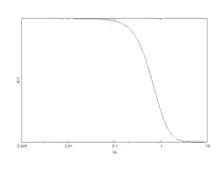Plummer model
The Plummer model or Plummer sphere is a density law that was first used by H. C. Plummer to fit observations of globular clusters.[1] It is now often used as toy model in N-body simulations of stellar systems.
Description of the model

The Plummer 3-dimensional density profile is given by
where is the total mass of the cluster, and a is the Plummer radius, a scale parameter that sets the size of the cluster core. The corresponding potential is
where G is Newton's gravitational constant. The velocity dispersion is
The isotropic distribution function reads
if , and otherwise, where is the specific energy.
Properties
The mass enclosed within radius is given by
Many other properties of the Plummer model are described in Herwig Dejonghe's comprehensive article.[2]
Core radius , where the surface density drops to half its central value, is at .
Half-mass radius is
Virial radius is .
The 2D surface density is:
,
and hence the 2D projected mass profile is:
.
In astronomy, it is convenient to define 2D half-mass radius which is the radius where the 2D projected mass profile is half of the total mass: .
For the Plummer profile: .
The escape velocity at any point is
For bound orbits, the radial turning points of the orbit is characterized by specific energy and specific angular momentum are given by the positive roots of the cubic equation
where , so that . This equation has three real roots for : two positive and one negative, given that , where is the specific angular momentum for a circular orbit for the same energy. Here can be calculated from single real root of the discriminant of the cubic equation, which is itself another cubic equation
where underlined parameters are dimensionless in Henon units defined as , , and .
Applications
The Plummer model comes closest to representing the observed density profiles of star clusters, although the rapid falloff of the density at large radii () is not a good description of these systems.
The behavior of the density near the center does not match observations of elliptical galaxies, which typically exhibit a diverging central density.
The ease with which the Plummer sphere can be realized as a Monte-Carlo model has made it a favorite choice of N-body experimenters, in spite of the model's lack of realism.[3]
References
- Plummer, H. C. (1911), On the problem of distribution in globular star clusters, Mon. Not. R. Astron. Soc. 71, 460.
- Dejonghe, H. (1987), A completely analytical family of anisotropic Plummer models. Mon. Not. R. Astron. Soc. 224, 13.
- Aarseth, S. J., Henon, M. and Wielen, R. (1974), A comparison of numerical methods for the study of star cluster dynamics. Astronomy and Astrophysics 37 183.